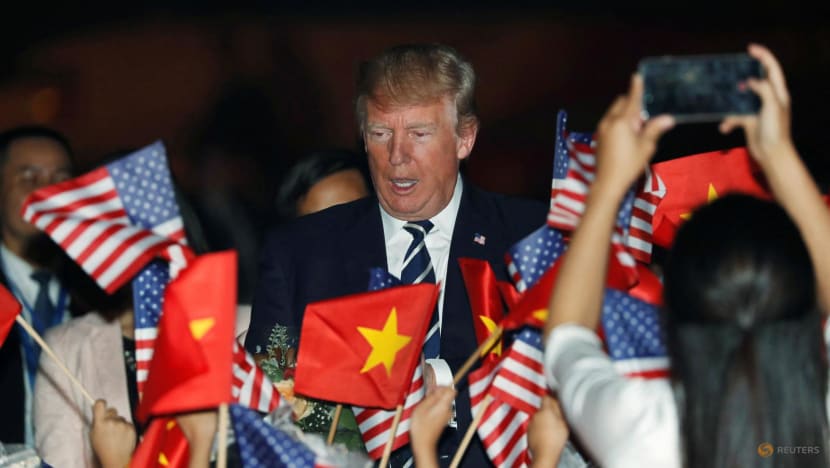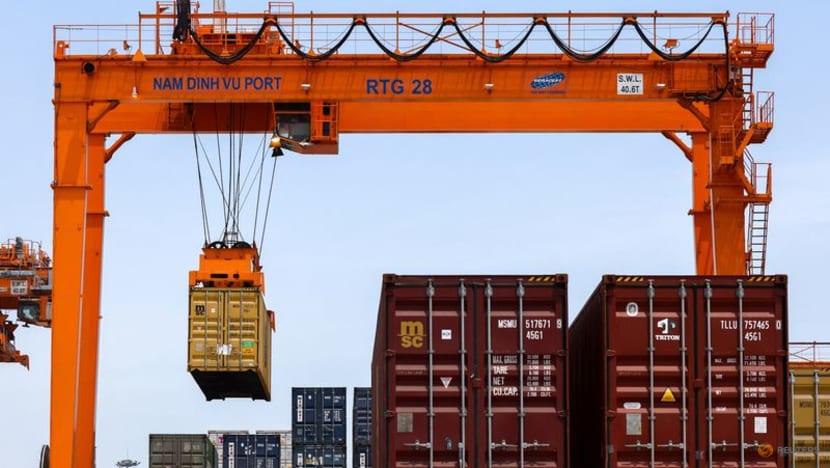Commentary: Trump’s ‘Great Deal’ with Vietnam is no trade agreement
It’s impossible to assess the impact of President Donald Trump’s “great deal of cooperation” with Vietnam right now, beyond its clear message of the US desire for increasing decoupling from China, says US politics expert Steven R Okun.

US President Donald Trump arrives aboard Air Force One at Noi Bai International Airport in Hanoi, Vietnam, on Nov 11, 2017. (File photo: REUTERS/Jonathan Ernst)

This audio is generated by an AI tool.
SINGAPORE: Just days before his trade negotiation deadline, United States Donald Trump announced on Wednesday (Jul 2) a “Great Deal of Cooperation” with Vietnam.
Trade agreements typically aim to eliminate trade barriers and to set rules that support high-standard, seamless trade that creates certainty for businesses. This US-Vietnam “deal” does not come close to that standard.
At most, this provides a mechanism to allow for the extension of negotiations. Vietnamese media reported the joint statement as a trade agreement framework.
At this point, there are few details beyond Mr Trump’s post on Truth Social. Vietnam looks set to receive a reduced tariff rate of 20 per cent, down from the threat of 46 per cent, in exchange for giving the US “total access” to its markets.
Indeed, this “deal” raises even more questions as to how far the US will go in requiring its trading partners (a word used loosely) to decouple themselves from China.

TARIFFS ARE RELATIVE
First things first. Did Vietnam negotiate a good deal by getting its tariffs reduced to 20 per cent?
It’s impossible to know. Because the relative tariff rate – compared to an economy’s neighbours and key competitors – counts most.
“Without knowing the tariff rates for Cambodia, Indonesia, Thailand, and especially India, we cannot assess the impact,” Travis Mitchell, executive director of the AmCham in Ho Chi Minh City told me. Future business plans and investment remain basically frozen, he added.
Furthermore, US tariffs on sectors deemed sensitive to national security are yet to come. If the US hits Vietnam with Section 232 tariffs on the wood and furniture sector, as well as the electronics, components and small household appliances sector, Vietnam’s rate will effectively be back over 40 per cent.
WHAT DOES DONALD TRUMP CONSIDER TRANS-SHIPMENTS?
There’s also a question of what Mr Trump considers “trans-shipments”, which he specified would attract a higher 40 per cent tariff rate. In a follow-up post on X, his Secretary of Commerce said trans-shipping meant “if another country sells their content through products exported by Vietnam to us.”
Neither man is clear with how they define “trans-shipping” in their social media posts.
Already, one cannot simply manufacture a product in China, send it to Vietnam, merely change the label and declare the certificate of origin to to be Vietnam, and export to the US. That is considered illegal.
However, taking a good manufactured in one place, sending it to another country, transforming into a new product and then exporting constitutes trade. At least for now.
“Without seeing the details of the agreement, assessing the pros and cons of the deal is not possible. For example, companies don’t know what the definition of trans-shipping refers to in the social media posts,” Adam Sitkoff, head of AmCham in Hanoi, told me.
Has the US just made illegal trans-shipments permissible with a 40 per cent tariff?
Or are trans-shipments still not allowed, but will any product exported from Vietnam to the US which contains any Chinese content be slapped with a 40 per cent tariff?
And how will they define Chinese content? A good manufactured in China? Or what about a Chinese-owned factory in Vietnam which produces that good?
“I am concerned that most of Vietnam’s exports will be assumed to be “trans-shipped” unless they are wholly obtained such as being grown or harvested from Vietnam with zero foreign inputs,” said Deborah Elms, head of trade at the Heinrich Foundation. Vietnam cannot compete if that’s the case.
FORCING A DECOUPLING FROM CHINA
This announcement marks a clear shift: The US pursues a strategic “decoupling” (or “de-risking”, depending on the Trump administration official being quoted) from China – and demands its trading partners do the same.
Mr Trump’s trade adviser Peter Navarro has called Vietnam a “colony of China”, claiming that as much as a third of its exports to the US were, in fact, Chinese goods rebranded as Vietnamese.
The US believes China poses a systemic challenge that cannot be addressed through bilateral restrictions.
Other governments share concerns about China’s unfair trade practices and the impact of its excess capacity being dumped in their markets, and are looking at decoupling on its own terms.
The amount of goods flowing from China through Vietnam to India mirrors the US experience.
Echoing US sentiments, Indian Commerce Minister Piyush Goyal dismissed an ASEAN-India trade pact as “silly”, remarking: “I am opening up my market to my competitors, many of whom have now become the B-team of China.”
For countries like Vietnam, which have thrived on Chinese-linked manufacturing, being caught in the middle will come at a great cost. If countries want meaningful access to the US market, they will be expected to disentangle themselves from China as well.
We don’t yet know exactly what the US requested or what Vietnam agreed to behind closed doors. But when those details emerge, governments and businesses should assume this deal sets the floor – not the ceiling – for what Washington and others will expect from trading partners hoping to avoid reciprocal tariffs.
CLARITY NOWHERE IN SIGHT
The announcement suggests Vietnam has agreed to some form of decoupling from China.
As a result, Vietnam will take a direct economic hit given how much trade and investment it has with China, which supports its exports to the US. This will impact companies’ bottom lines and investors’ returns.
Also, how will China retaliate? The Chinese government explicitly warned other countries against curbing trade with them in exchange for lower US tariffs and promised to retaliate against countries that do so. That clearly applies here.
Businesses and investors need certainty. The real prize of foreign investment for the US and its trading partners will only come if the rules for trade are predictable and long-term.
What we have right now from the US and Vietnam does not achieve that.
Steven Okun serves as CEO of APAC Advisors, a geostrategic and responsible investment consultancy based in Singapore. He served as Deputy General Counsel at the US Department of Transportation in the Administration of President Bill Clinton. Noemie Viterale contributed as well.





















